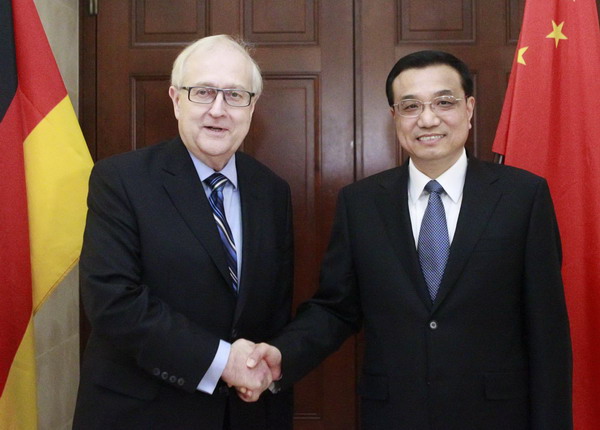Visit a boost to Europe economy
Updated: 2011-01-07 12:31
By Wu Jiao (China Daily European Weekly)
Shen Yannan, vice-chairman of the Chinese Association for European Studies, said China and the EU have no fundamental clash of interests as they have similar goals.
Yet, there will continue to be friction because China and European countries are at different development levels. But continuing growth of their societies will help to reduce friction, Shen said.
Xing said the three countries Li is visiting all play important roles in China-EU ties. Spain, a country that bridges China and Latin American countries, has pushed for policies to improve ties while it chaired the EU in 2010.
And a better relationship with Germany, which has generated EU integration, will benefit China-EU relations as a whole.
|
 German Economy Minister Rainer Bruederle (L) shakes hands with Chinese Vice-Premier Li Keqiang in Berlin, Jan 6, 2011. [Photo/Agencies]
|
Li's trip is widely believed to help revive the EU's embattled economy, while seeking more cooperation on sectors that will help ensure China's restructuring of its energy-reliant economy.
The agreements signed in Spain has made world headlines, with many reports saying China will continue to buy European bonds, including Spain's.
Beijing's ambassador to Madrid, Zhu Bangzao, said on the eve of Li's visit that the trip will "play a key role in helping Spain and other EU nations tide over the impact of the financial crisis and restore financial market confidence".
In an article, "China lends a hand as Spain climbs from economic doldrums", the US-based Christian Science Monitor said Li's visit could be an economic boost as the country sees unemployment fall and appears on target to reduce its deficit.
In Spain, the Barcelona Reporter said Li's visit brings hopes of economic support, while APF said Chinese officials will, with their Spanish counterparts, address the country's economic woes.
China has pledged to support the struggling eurozone economies against the threat of a debt crisis after Greece and Ireland were forced to resort to international financial bailouts.
Chinese leaders visited Greece and Portugal in 2010, the two countries worst hit financially, to provide support.
China also sent a clear message at the third China-EU High Level Economic and Trade Dialogue in Beijing recently that it supported the financial stabilization package of the EU and the International Monetary Fund, and will help some EU members address their debt problem.
Besides helping the EU, China is seeking cooperation to help restructure its energy-reliant economy.
Germany's ambassador to China, Michael Schaefer, has said that 2011 will see more opportunities for China and Germany, especially in low-carbon and green economy-related issues.
Germany has the advantage in the heavy and high-tech industries, and it has become an important trading partner to China.
It is expected that the Chinese delegation will inspect Germany's new energy projects.
As for Britain, its government is trying to expand exports and attract more inward investments, while China is trying to boost domestic demand and encourage its businesses to "go global".
Closer business ties between China and the UK, or "partnership for growth" as British Prime Minister David Cameron puts it, are needed to restructure and develop the two economies, Liu Xiaoming, China's ambassador to the UK, wrote in The Telegraph.
Qu Xing, professor with the Beijing-based Foreign Affairs College, said China and Europe have huge potential in economic and technology cooperation.
As China emphasizes the restructuring of its economic development from being energy consuming to green energy and high-tech driven, EU countries have made headway in sectors that can serve the demand of the Chinese market.
In an era of globalization and interdependence, the health of the European economy is not just a matter for the Europeans, Qu said.
Bilateral trade between China and Europe reached $430 billion during the first 11 months of 2010 - a 30 percent surge compared with the same period of the previous year, with European exports to China growing rapidly.
E-paper

Ear We Go
China and the world set to embrace the merciful, peaceful year of rabbit
Preview of the coming issue
Carrefour finds the going tough in China
Maid to Order
Specials

Mysteries written in blood
Historical records and Caucasian features of locals suggest link with Roman Empire.

Winning Charm
Coastal Yantai banks on little things that matter to grow

New rules to hit property market
The State Council launched a new round of measures to rein in property prices.
